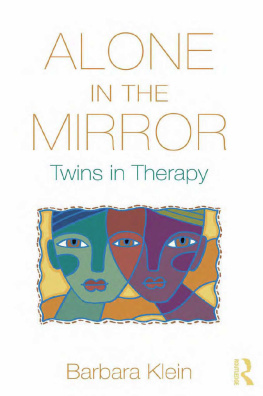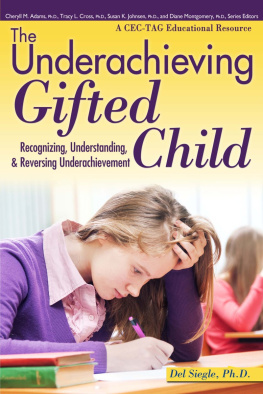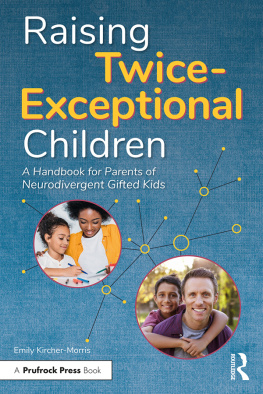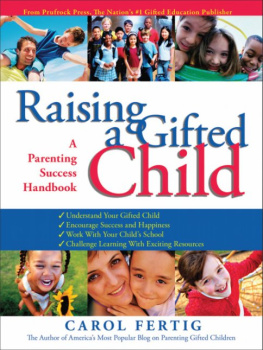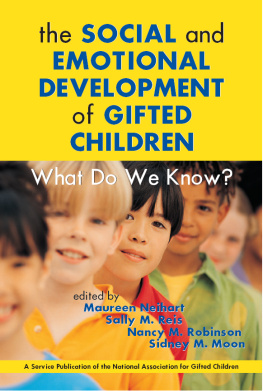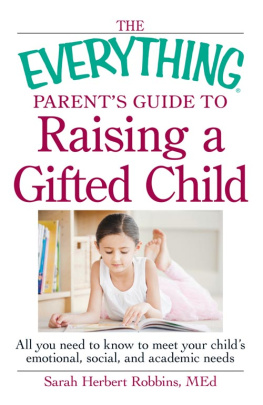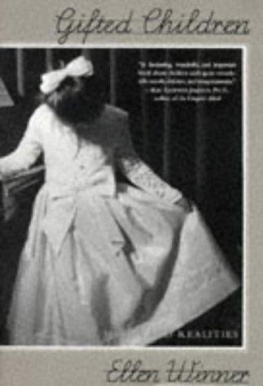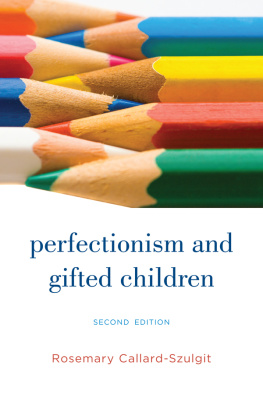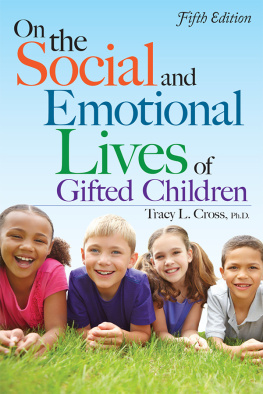The Challenges of Gifted Children
EMPOWERING PARENTS TO MAXIMIZE THEIR CHILDS POTENTIAL
Barbara Klein
Foreword by John D. McNeil

Copyright 2015 by Barbara Klein
All rights reserved. No part of this publication may be reproduced, stored in a retrieval system, or transmitted, in any form or by any means, electronic, mechanical, photocopying, recording, or otherwise, except for the inclusion of brief quotations in a review, without prior permission in writing from the publisher.
Library of Congress Cataloging-in-Publication Data
Klein, Barbara Schave.
The challenges of gifted children : empowering parents to maximize their childs potential / Barbara Klein ; foreword by John D. McNeil.
pages cm
Includes bibliographical references and index.
ISBN 9781440833380 (hard copy : alk. paper) ISBN 9781440833397 (ebook) 1. Gifted children. 2. Child rearing. 3. Parent and child. I. Title.
HQ773.5.K5382015
649.155dc232015015703
ISBN: 9781440833380
EISBN: 9781440833397
19 18 17 16 151 2 3 4 5
This book is also available on the World Wide Web as an eBook.
Visit www.abc-clio.com for details.
Praeger
An Imprint of ABC-CLIO, LLC
ABC-CLIO, LLC
130 Cremona Drive, P.O. Box 1911
Santa Barbara, California 93116-1911
This book is printed on acid-free paper 
Manufactured in the United States of America
To my treasured and gifted family: Elizabeth, Jonathan, Kim, Richard, and Paul
Contents
CHAPTER 1:
Giftedness Is the Childs Legacy
CHAPTER 2:
The Smart Parents Struggle to Be Good Enough
CHAPTER 3:
Discipline and Setting Limits for Gifted Children Is Challenging
CHAPTER 4:
How to Live with Your Smart Childs Intensity
CHAPTER 5:
Gifted Childrens Common Learning Struggles
CHAPTER 6:
Parents and Schools Working Together toward Educating Gifted Children to Their Truest Potential
CHAPTER 7:
Everyday Issues of Gifted Kids and Their Families
CHAPTER 8:
Maximizing Your Childs Potential
Foreword
The author of The Challenges of Gifted Children, Dr. Barbara Klein, is acclaimed both for her specialized knowledge of giftednessscholarship, research, teaching, writingand her extraordinary successful therapeutic counseling of gifted children and their parents. In this book, she brings to life the voices of gifted children, illuminating new insights into their special strengths and developmental needs. Further, the author presents accounts and case studies from parents of these children that reveal unique concerns parents have when their child is gifted. Noteworthy is Kleins effective uncovering of the issues thwarting child and parent and her engagement of them in ways that overcome developmental blocks, replacing parental uncertainty and despair with a new confidence.
Beyond the gifted and their parents, others will profit greatly, as child and parent adhere to the understandings and practices delineated in CGC. Enhanced domestic relations and quality of family life for all, for example, are common outcomes for those receiving Kleins guidance for the gifted.
The Challenges of Gifted Children casts about for a big net of readers. In addition to new understandings of the nature of giftedness and the enhancement of talent, parents of gifted and nongifted alike while reading CGC, will be led to re-examine their motives and roles in parenting, bringing to bear new cautions and insights underlying this old question: Am I trying to make another like me when one is enough?
Teachers will learn how to identify and understand their gifted studentsemotionally, intellectually, socially, academicallylearning how to both address their exceptionality and contribute to the enrichment of the class.
In reading this book, school leaders and reformers will become aware of the deficiencies in schooling of the gifted as well as the emergence of innovative departures based on new understandings of the gifted in relation to school safety, acceleration, individualism, and the importance of social skills. Although Klein emphasizes parental care in selecting the right school for ones gifted child, and subsequently parental participation in school life, she shows how schools, in becoming right schools for the gifted, can become better schools for all.
This book is a comprehensive but readable text with scope for readers to connect with their own concerns. A spouse will draw a partners attention to a particular revelation. A mother or grandmother will want the other to read the section that speaks directly to issues affecting the guidance she wants to provide her gifted child. Although the author is an expert on giftedness and experienced in overcoming obstacles to its promise, she offers respectful but firm treatment for the gifted and their caregivers.
John D. McNeil, Professor Emeritus
Graduate School of Education & Information Studies, University of CaliforniaLos Angeles (UCLA)
Acknowledgments
Paul Macirowski, my soulmate and writing partner/editor, helped me through the entire process of writing The Challenges of Gifted Children: Empowering Parents to Maximize Their Childs Potential.
Pauls wisdom, sensitivity, and commitment to working with me and the many families with gifted children who consult me, has sustained me through good times and trying, as well as discouraging times that were involved in writing this book.
I am grateful and appreciative to the parents who have consulted with me and shared their thoughts and feelings with me in words and in writing. Their ideas and opinions make my new book more meaningful and accessible to my reader.
Joelle List helped me with typing and preparing the manuscript efficiently and accurately. Her assistance and positive attitude were valuable as I worked to complete this book.
Johanna Keogh and Daniella Batsheva worked with me to design the jacket cover with seriousness and grace. They were open to my ideas and tried to communicate them in drawings to the marketing department. I appreciate their time and effort of my behalf.
Lastly, but not leastly, I am grateful to all of the children who have come to play with me and share their excitement and concerns. Asynchronous development was again and again brought to life by these special and precocious children, whose gifts I hope will make this world a better place in which to thrive.
Introduction
Dealing with the high points of giftednessdiscovery, insights, and prestigeand the low pointsdespair, darkness, and feelings of failurehas punctuated my personal and professional life. My deep curiosity about what it really means to be a successful gifted person began in childhood. As a six-year-old, I was not thinking about giftedness from an artistic, academic, or clinical perspective, but I did wonder why my mother thought my older brother Alan was a genius. Alan attended the special opportunity classes at Rosewood Avenue School in West Hollywood. My twin sister Marjorie and I went only to the regular classes, happily, without any envy for what our brother was learning. We wondered about what was such an opportunity in his classroom.
But more strange and unusual events occurred because our brother had unquenchable interests in outer space that Marjorie and I found unique and also entertaining. Alan was always building rocket ships with his friends in our back yard. And once we went as a family with his friends to the Mojave Desert to watch him launch his rocket ship. I remember my sister and I sitting in the sand trying really hard not to get sand in our peanut butter and jelly sandwiches. We were six and enjoyed the adventure.
Next page

